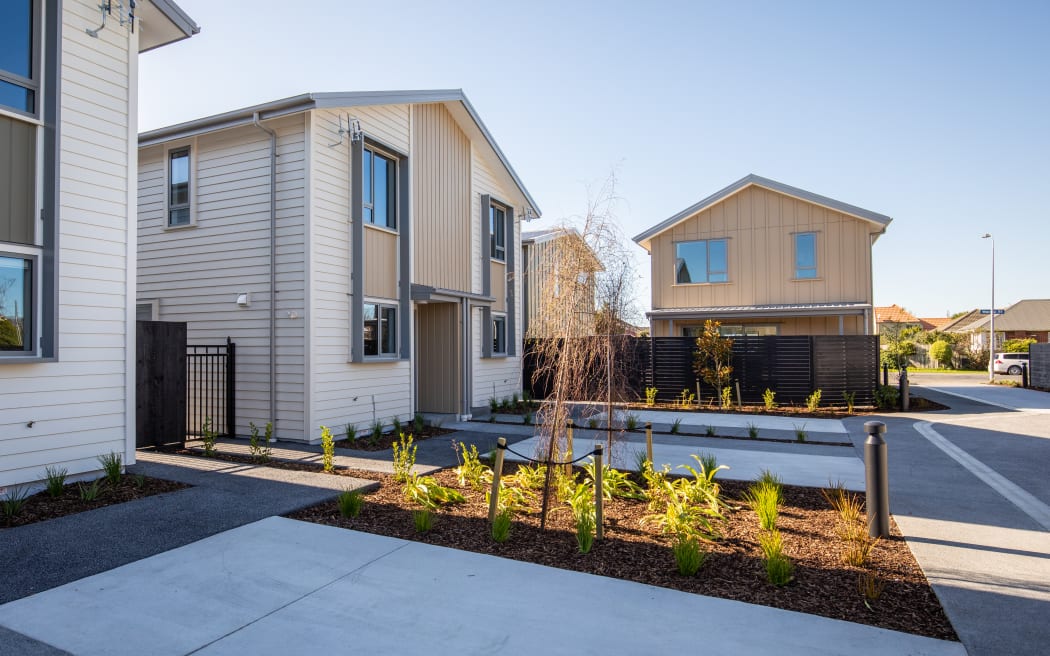
File photo. Photo: RNZ / Nate McKinnon
Analysis - First-home buyers are still seeing benefits from lower prices and less competition, despite rents being cheaper than mortgages. But a low rental stock is keeping rents high and the government is being called on to pull some more levers to attract investors back in. Here's what moved real estate this week.
Who's buying?
First-home buyers appear to be taking full advantage of lower property prices and less competition from other buyers.
CoreLogic's latest First Home Buyer Report indicates the group accounted for 26 percent of purchases in the first quarter of the year, which is well above the long-term average of 21 percent.
And above average first-home buyer (FHB) activity was expected to continue into 2025, CoreLogic chief property economist Kelvin Davidson said.
FHBs had remained consistently active since late 2022, he said.
The median house price fell to $695,000 in Q1 2024, compared with $699,000 last year, and $715,500 in 2022.
"The price being paid by FHBs is significantly higher than the lower quartile, or bottom 25 percent, of all buyers, where the median price is $565,000," Davidson said.
Low-deposit lending allowances at banks, grants and loans, in addition to draw-downs on KiwiSaver accounts, were helping FHBs, Davidson said.
But the return of 80 percent interest deductions, the loosening of CCCFA and LVR rules, and a shorter brightline test from 1 July, could mean more competition in the market.
Renters still struggling
Changes to interest deductibility on residential rental properties and the 90-day eviction law have yet to impact the rental stock.
Impression Real Estate measured rental activity across 1000 properties in Auckland between November 2023 and April 2024.
The agency's chief executive, Rishabh Kapoor, said people viewing each rental property had doubled in the past six months. Homes between $450 and $750 per week were in highest demand.
Residential vacancy rates dropped from 3.8 percent to 2.3 percent and prices increased by 6 percent over the same period, he said.
More needed to be done to correct the "imbalance in the rental market, especially in the CDB where landlords have had no perceived control over their tenancies", he said.
"The tribunal was seen as a tenant's service rather than a rental tribunal."
A survey by Manawatū Tenants Union (MTU) found renters in Palmerston North and the wider Manawatū region were grappling with rent unaffordability - with some spending nearly 70 percent of their income on rents.
It found 89 percent of the 204 responses had little confidence in the government's ability to positively impact the housing market.
"With stagnant incomes, limited housing supply inflating costs, and renter safeguards under attack, the situation is drastically tilted against overburdened tenants," MTU co-ordinator Cam Jenkins said.
Regulating property managers
Furthermore, Kapoor said property managers should be regulated - a move the government abandoned, indicating the cost-benefit analysis was marginal and uncertain.
The bill would have established a regulatory regime for property managers, including minimum entry requirements, professional standards of practice, and a complaints and disciplinary process.
Poorly performing property managers were keeping overly cautious investors away from adding to the rental stock, Kapoor said.
However, Housing Minister Chris Bishop said adding more regulation to the rental property market was not the answer.
In an industry "where a modest one-person property management business can oversee assets totalling $60 million in retirement savings, it is inconceivable that such a significant sector remains unregulated", Real Estate Institute chief executive Jen Baird said.
Zoning changes in Wellington
The government has signed off on a number of Wellington City Council's housing intensification recommendations.
Bishop, who is also the Minister for RMA Reform, approved nine of the council's 10 recommendations, including zoning a strip of Adelaide Road as City Centre Zone, and classifying the Johnsonville train line as rapid transit.
These changes will allow six-storey apartment buildings to be built within a 15-minute walk of the city centre, and developments of one to three residential units in medium and high-density residential zones are exempt from the minimum front and side yard requirements.
The move was welcomed by property developers, but they cautioned current market conditions and economic viability could put projects out well over a year.
Separately, Bishop also signed off recommendations put forward by the Western Bay of Plenty District Council. Now more houses can be built in Ōmokoroa and Te Puke, where there is already access to infrastructure, amenities, and community services.
Making Auckland properties flood-safe
Auckland Council is urging flood-affected homeowners to do their bit to future-proof the city against further flooding.
The council visited 1300 other properties affected by last year's floods and helped them identify major flood risks like roofs without spouting and blocked drains.
But while it is offering its services to check houses, it is not offering any cash to help homeowners make these changes.
Banking
ANZ said increased competition had seen first-half interest rate margins squeezed with fewer customers looking to borrow money.
The ANZ Bank's profit and revenue in the six months ended in March was steady with the year earlier, despite increasing competition for business.
ANZ chief executive Antonia Watson said the bank had been able to grow its market share of the housing market, with a $10 billion increase in home lending, though margins were down by 4 basis points.
And Westpac said it was dropping its short-term home loan interest rates which were popular right now.
"We're responding by trimming our six-month and 12-month rates to 7.29 percent pa [per annum] and 7.24 percent pa respectively," Westpac product, sustainability and marketing, general manager Sarah Hearn said.
"But we know some customers are looking for longer-term certainty, so we're responding and simplifying our offerings with cuts to our three-year and four-year rates that mean we now have the same 6.39 percent rate across our three, four and five year terms."
Social housing
A unique social housing project is set to open in Dunedin next month.
The Loan and Mercantile building on the city's waterfront will have 30 apartments for low-income tenants from the government's Housing Register. It will also have luxury apartments on another floor.
The developer, Lund Dunedin owner Russell Lund said it would likely be the first social housing project in the country inside a heritage-listed building.
For developers wanting to go down the same route, he said it was economically more feasible to redevelop an existing heritage building with a large floor plate.





